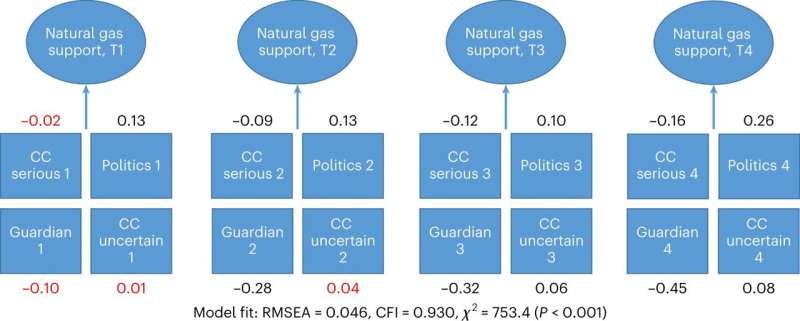Conditional latent growth model. Note: coefficients in red are not statistically significant. CC, climate change. Credit: Nature Climate Change (2023). DOI: 10.1038/s41558-023-01622-7
The public's concerns about climate change could reduce support for natural gas as an alternative fuel source, research suggests.
People who were concerned about climate change were more likely to oppose natural gas extraction, which is often promoted as a relatively clean way to reduce emissions, the study says.
Researchers found that the degree to which people believed climate change to be serious and evidence on climate change to be reliable determined the strength of their opinions about natural gas production.
Experts at the University of Stirling contributed to the design of a questionnaire and 1,000 people were surveyed in the U.K. in April 2019 and asked the same questions again each year for four years.
The group were asked to what extent they believed climate change is serious, and the degree to which they thought the evidence on climate change is reliable.
They were also asked to give their opinion on extracting natural gas in the U.K. Those surveyed gave their views about offshore gas extraction via drilling beneath the seabed, traditional onshore drilling, and fracking—the recovery of gas from shale rock.
The results showed that support for North Sea gas development was at 80% in 2019, 74% in 2020, 66% in 2021, but then increased to 70% in 2022.
With each annual survey, climate change beliefs increasingly affected views on natural gas development, experts said. Believing climate change is serious predicted opposition to gas extraction eight times more strongly in 2022 compared to 2019.
The results suggest climate change beliefs increasingly predict opposition to natural gas, the researchers say.
Dr. Jen Dickie, who leads the University of Stirling team on the project, said, "As the U.K. progresses its journey to net zero, understanding how people's beliefs about climate change are related to their support or opposition to natural gas extraction in the U.K. can help provide a valuable insight into how the public may react to government energy policies involving the continued use of fossil fuels."
The research was carried out in partnership with the Universities of Edinburgh, Bath, Exeter, Heriot-Watt, Reading, Warwick in the U.K., and the Universities of Utah State and Michigan State in the United States.
The study, "Growing importance of climate change beliefs for attitudes towards gas," is published in Nature Climate Change.
More information: Darrick Evensen et al, Growing importance of climate change beliefs for attitudes towards gas, Nature Climate Change (2023). DOI: 10.1038/s41558-023-01622-7
Journal information: Nature Climate Change
Provided by University of Stirling
























